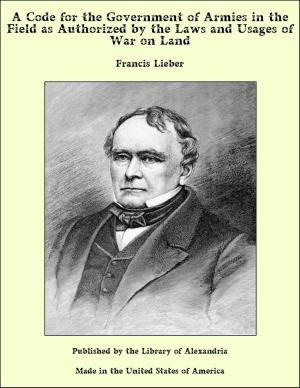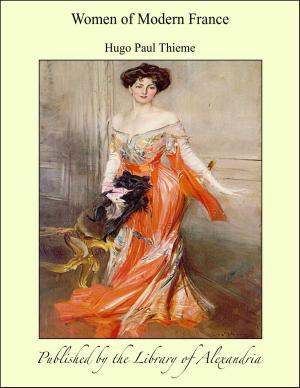| Author: | Anonymous | ISBN: | 9781465541079 |
| Publisher: | Library of Alexandria | Publication: | July 29, 2009 |
| Imprint: | Library of Alexandria | Language: | English |
| Author: | Anonymous |
| ISBN: | 9781465541079 |
| Publisher: | Library of Alexandria |
| Publication: | July 29, 2009 |
| Imprint: | Library of Alexandria |
| Language: | English |
That wisdom made its definite entrance into the Catholic fold about A.D. 500, in the writings of the profound and nameless mystic who chose to call himself "Dionysius the Areopagite." Three hundred and fifty years later, those writings were translated into Latin by John Scotus Erigena, a scholar at the court of Charlemagne, and so became available to the ecclesiastical world of the West. AnOther five hundred years elapsed, during which their influence was felt, and felt strongly, by the mystics of every European country: by St. Bernard, the Victorines, St. Bonaventura, St. Thomas Aquinas. Every reader of Dante knows the part which they play in the Paradiso. Then, about the middle of the 14th century, England--at that time in the height of her great mystical period--led the way with the first translation into the vernacular of the Areopagite's work. In Dionise Hid Divinite, a version of the Mystica Theologia, this spiritual treasure?house was first made accessible to those outside the professionally religious class. Surely this is a fact which all lovers of mysticism, all "spiritual patriots," should be concerned to hold in remembrance. Nothing is known of him; beyond the fact, which seems clear from his writings, that he was a cloistered monk devoted to the contemplative life. It has been thought that he was a Carthusian. But the rule of that austere order, whose members live in hermit?like seclusion, and scarcely meet except for the purpose of divine worship, can hardly have afforded him opportunity of observing and enduring all those tiresome tricks and absurd mannerisms of which he gives so amusing and realistic a description in the lighter passages of the Cloud. These passages betray the half?humorous exasperation of the temperamental recluse, nervous, fastidious, and hypersensitive, loving silence and peace, but compelled to a daily and hourly companionship with persons of a less contemplative type: some finding in extravagant and meaningless gestures an outlet for suppressed vitality; Others overflowing with a terrible cheerfulness like "giggling girls and nice japing jugglers"; Others so lacking in repose that they "can neither sit still, stand still, nor lie still, unless they be either wagging with their feet or else somewhat doing with their hands." Though he cannot go to the length of condemning these habits as mortal sins, the author of the Cloud leaves us in no doubt as to the irritation with which they inspired him, or the distrust with which he regards the spiritual claims of those who fidget. The attempt to identify this mysterious writer with Walter Hilton, the author of The Scale of Perfection, has completely failed: though Hilton's work--especially the exquisite fragment called the Song of Angels--certainly betrays his influence. The works attributed to him, if we exclude the translations from Dionysius and Richard of St. What, then, were his special characteristics? Whence came the fresh colour which he gave to the old Platonic theory of mystical experience
That wisdom made its definite entrance into the Catholic fold about A.D. 500, in the writings of the profound and nameless mystic who chose to call himself "Dionysius the Areopagite." Three hundred and fifty years later, those writings were translated into Latin by John Scotus Erigena, a scholar at the court of Charlemagne, and so became available to the ecclesiastical world of the West. AnOther five hundred years elapsed, during which their influence was felt, and felt strongly, by the mystics of every European country: by St. Bernard, the Victorines, St. Bonaventura, St. Thomas Aquinas. Every reader of Dante knows the part which they play in the Paradiso. Then, about the middle of the 14th century, England--at that time in the height of her great mystical period--led the way with the first translation into the vernacular of the Areopagite's work. In Dionise Hid Divinite, a version of the Mystica Theologia, this spiritual treasure?house was first made accessible to those outside the professionally religious class. Surely this is a fact which all lovers of mysticism, all "spiritual patriots," should be concerned to hold in remembrance. Nothing is known of him; beyond the fact, which seems clear from his writings, that he was a cloistered monk devoted to the contemplative life. It has been thought that he was a Carthusian. But the rule of that austere order, whose members live in hermit?like seclusion, and scarcely meet except for the purpose of divine worship, can hardly have afforded him opportunity of observing and enduring all those tiresome tricks and absurd mannerisms of which he gives so amusing and realistic a description in the lighter passages of the Cloud. These passages betray the half?humorous exasperation of the temperamental recluse, nervous, fastidious, and hypersensitive, loving silence and peace, but compelled to a daily and hourly companionship with persons of a less contemplative type: some finding in extravagant and meaningless gestures an outlet for suppressed vitality; Others overflowing with a terrible cheerfulness like "giggling girls and nice japing jugglers"; Others so lacking in repose that they "can neither sit still, stand still, nor lie still, unless they be either wagging with their feet or else somewhat doing with their hands." Though he cannot go to the length of condemning these habits as mortal sins, the author of the Cloud leaves us in no doubt as to the irritation with which they inspired him, or the distrust with which he regards the spiritual claims of those who fidget. The attempt to identify this mysterious writer with Walter Hilton, the author of The Scale of Perfection, has completely failed: though Hilton's work--especially the exquisite fragment called the Song of Angels--certainly betrays his influence. The works attributed to him, if we exclude the translations from Dionysius and Richard of St. What, then, were his special characteristics? Whence came the fresh colour which he gave to the old Platonic theory of mystical experience















